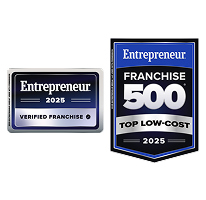You’ve got investment capital, a dream, ambition, energy, and a strong entrepreneurial spirit. What else could you possibly need to pursue the purchase and successful operation of a business franchise?
You know that’s the sort of business model you want to pursue, because you like inheriting an established brand, gaining training and ongoing support from the experts, and following a structure and way of doing business that’s a proven winner. You’ll be your own boss — but never alone.
But hold up a second.
Have you gone through the franchise due diligence process? Skipping it or taking shortcuts to save time could be the kiss of death to your venture. Learn how to conduct effective due diligence.
How to Properly Research a Franchise Opportunity
The franchise due diligence process, if done properly, will filter out the poor options and highlight the selection that will work best for you in terms of cost, franchisor training and support, brand and market strength, passion, and other factors.
What should be on your franchise investigation checklist? What are the possible penalties for neglecting the 90-day franchise due diligence process altogether? Read on.
Why the Proper Franchise Due Diligence Process Can Save You $100,000 or More
You’ll invest plenty in your goal of owning a profitable franchise. The franchise fee alone could cost you anywhere from a few thousand dollars to seven figures, depending on the awareness and strength of the brand and the complexities of ownership.
Add to that start-up costs that could include real estate, signage, expensive equipment or gear, hiring and training a workforce, marketing and advertising costs, and other upfront expenses.
How long will you have to run your new company before it starts to return a profit? Put that into your calculations.
Now imagine that the opportunity isn’t what you had imagined it to be. You’re under-capitalized. There’s scant brand recognition or loyalty or even negative appeal. The competition is stiffer than you were told it would be. Your territory is actually shared by other franchisees, so you’re all fighting for business from the same prospects.
The list of possible strikes against your new enterprise goes on. As your obstacles and roadblocks stack up, your capital dwindles. That’s how you could quickly become six figures in the hole.
Fortunately, you can avoid this nightmare scenario with 90-plus days of a careful franchise due diligence process. Here’s how your franchise investigation checklist might run.
Phase 1: Initial Franchise Investigation (Days 1–14)
Divide this first-phase job into three productive steps.
Step 1: Define Your Investment Criteria
What are you looking for? How would you like to spend your days in business — and what would you like to avoid?
Determine that, and go deeper. What’s your risk tolerance? How much can you afford to lose with rookie mistakes if you’re a first-time business owner? Where would you like to work geographically? If you buy a franchise in your hometown simply because that’s where you are now, are you committed to staying there? If you’ve always wanted to move, you’d better do it now and shop for a franchise in your dream location.
You must also figure out how much money you have and the amount you’ll need to finance your venture. Will you need partners? Investors?
Step 2: Research the Franchise Concept
Do you have a clear idea of what a franchise is and how that business model operates? Make sure your expectations of what you can and can’t do in a franchise environment are realistic.
Start your preliminary research. Is there market demand? Is it oversaturated? What’s the competition like? Does the growth of your business seem like a realistic expectation? Scope out your geographic location and listen to any doubts or misgivings you might have over a specific opportunity.
Step 3: Initiate Franchisor Background Check
Not every opportunity comes exactly as advertised. You probably already know that if you’ve ever had a job that left you feeling that there was a noticeable gap between the promise and the reality.
It’s the same with franchise opportunities. Listen to but go beyond the franchisor’s sales pitch. Look into the company history and the track record of its management team. Read a few annual or quarterly reports if you can get hold of them. Look for third-party news items — both good and bad — you can find online.
Have other franchisees posted reviews and indicated how the promises track with the real deal? You can find out a lot by merely surfing the web.
Phase 2: Franchise Disclosure Document (FDD) Analysis (Days 15–30)
Are you starting to get serious about an opportunity? Then it’s time to request a franchise disclosure document and follow this deep dive FDD analysis guide.
Step 4: Obtain and Carefully Review Your FDD
Making an FDD available is a legal requirement of the Federal Trade Commission (FTC). It’s your written documentation of the franchise offer, in great detail.
Read it carefully and critically. It will reveal important information, such as the business structure, the franchisor’s key management team, the corporation’s financials, and the breakdown of investment costs and obligations of both parties.
Study the FDD analysis guide carefully. If you’re still interested, ask your partners, investors, and advisors to similarly review the document.
Step 5: Analyze Financial Performance Details
There’s much to be learned in the financial information provided in your prospective franchisor’s FDD. The content should be clear, transparent, and informative.
You should be able to learn the historical performance data of other franchisees, your expense categories, and expected profit margins. Bottom line: What will this opportunity really cost you?
Step 6: Learn Your Territory Rights and Restrictions
What does your franchise footprint look like? How close is the nearest franchisee? Will you be competing for clients or customers in overlapping territories?
Will you have expansion rights if the business is successful?
Take your time reviewing the FDD and getting the input of trusted others. Take their FDD analysis guide comments seriously, or ignore the experts at your own peril.
Phase 3:Take a Financial Deep Dive (Days 31–45)
Here’s where the rubber meets the road. Now you’re talking dollars and sense. You’re critically examining the financials and the return on investment logic behind those numbers. You’ll definitely want your financial and legal experts to be involved. That means your accountant, lawyer, and investors or partners, if you have any.
Step 7: Calculate Your Total Investment Requirements
Start by creating realistic financial projections. Avoid the temptation of exaggerating the revenue potential here. Make sure you understand all cost categories, configure your cash flow, and make a break-even analysis.
Stay conservative. You’d rather be pleasantly surprised by making more than anticipated than to be involved in an emergency situation because you miss your break-even point by a great deal or you can’t make payroll.
Step 8: Validate Your Financial Projections
By this point, you will have generated quite a lot of data — but what does it mean? How do those figures stack up against industry norms?
Make industry benchmark comparisons to find out. Take into consideration seasonal variations if that matters in your business category.
Finally, huddle with your team and listen to all viewpoints. Does the deal still make sense? Listen to your brain, not just your heart.
Phase 4: In-Depth Franchise Investigation (Days 46–60)

You might have had long discussions with the representative by this point, and you certainly know how the corporate team positions the opportunity. But that’s not the only way to appraise the offer. It’s time to talk to others who’ve taken the road you’re considering.
Chat with other franchisees. Learn how close reality on the streets comes to the promise from the corporate boardroom.
Step 9: Interview Current Franchisees
Sometimes the most disarming way of opening these lines of communication is to just show up. Courteously wait if they’re not readily available, or make an appointment for a future date if they prefer to do it that way.
Don’t let your representative arrange meetings. The franchisor might be eager for you to meet their top performers, but that group might not be representative of the experiences of more typical franchisees.
Take your contacts out for coffee so they’re away from business distractions. Make sure they understand that you’re not opening a location in direct competition with their business. That way, they won’t paint a negative picture just to chase you away.
Keep it casual, and read between the lines of everything you’re told.
Step 10: Contact Former Franchisees
You might get another point of view from this group. You might find such entrepreneurs by searching online for “former (name of franchise) franchisees” or similar queries.
Why did they sell their franchise? Were there hidden obstacles? Did their financial performance match expectations? Just remember, if the views are brutally negative, they might not be impartial. However, these views might balance those of franchisees who have a more positive outlook regarding the corporation.
Phase 5: Legal and Professional Review (Days 61–75)
This is where you conduct your final huddle with your expert team and ask all of the tough questions. Address issues in doubt. By this point, you will have spoken with a franchise representative and active and former franchisees. You’ve reviewed the FDD and scoured the internet for news, both good and bad.
Step 11: Engage Your Professional Advisory Team
They and you have studied this opportunity thoroughly by now. Ask for their final decisions on the advisability of moving forward. Then either take their advice or counter it in full awareness that you’re on your own. You’ll feel much better, though, if your team is on your side and as excited about the potential as you are.
Phase 6: Final Decision Framework (Days 76–90)
By the end of this final phase, you will have made up your mind. You’ll either walk away or shake hands and sign paperwork to become a franchisee.
Step 12: Comprehensive Evaluation Scorecard
Consult your franchise investigation checklist. How is this candidate doing? If your final decision is to proceed, start to plan your timeline. When will you begin to receive training and ongoing support? When can you actually launch your business?
If your decision is to bypass this opportunity and try something else, start your franchise diligence process all over again. There’s no shame in walking away at any point during or after a 12-step franchise diligence process. That’s what it’s there for — to help you evaluate and decide which franchise opportunity to pursue, and which to avoid.
If done right, you’ll find the one perfect deal that will put you on a career track that fits your dreams and ambitions and rewards your hard work.
Critical Red Flags to Your Franchise Due Diligence Process
Not every franchise opportunity is ripe for your involvement — or for anyone’s, for that matter. Listen to your subconscious if alarm bells go off for any reason at all.
Be suspicious, for instance, if the franchise representative seems to be rushing you toward a decision with high-pressure sale tactics. Watch out for financial projections that sound unrealistic.
Turn away immediately if the franchisor stalls on giving you an FDD. Your FDD analysis guide is a key step in your franchise due diligence process. And when you do get to see this important document, make sure the written word meshes with what you’ve been told verbally. If it doesn’t, that should trigger alarms.
The reason you follow these evaluation checklist steps so carefully is to arrive at a decision you can trust. Rejecting the wrong opportunity is simply part of the process.
Consider Putting Freeway Insurance Through Your Franchise Evaluation Steps
We’d be honored if you considered ownership of a Freeway Insurance franchise. If you put us through your franchise due diligence process, we know we can win your serious consideration.
Freeway is one of the nation’s largest personal line insurance companies and one of the best service franchises on the market.
That’s why successful entrepreneurs are operating Freeway franchises coast to coast: It is one of the growing business franchises to own in 2025. Each franchisee owns their own business, but benefits from the comprehensive training program and 24/7 support when they need and want it.
Interested? Please put us on your franchise investigation checklist. Then contact your franchise representative by calling us at 877-822-3024.
You can also give us your contact information, and we’ll reach out to you.



